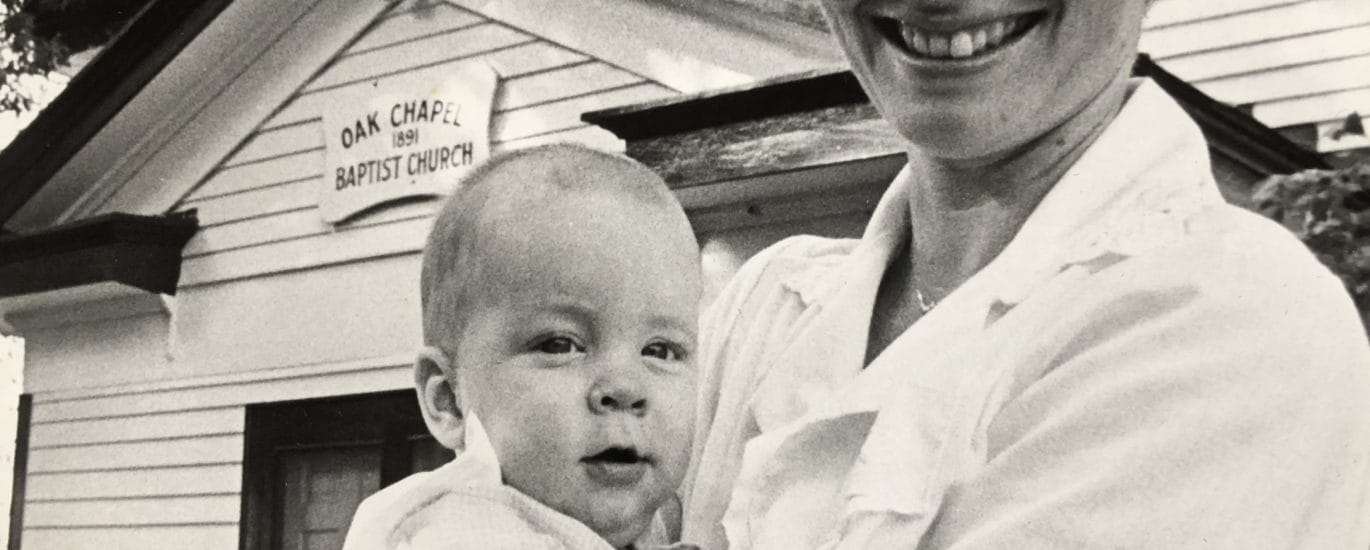By Andrew Gardner
Few people have embodied the spirit of the Alliance of Baptists better than Paula Clayton Dempsey. At the organization’s Ten-Year Anniversary in 1997, the Alliance awarded superlatives—the most spirited award went to Paula. Twelve years later, the Alliance called Paula to serve as minister of partnership relations, and in so doing Paula became the public face of the organization. She never had “visions of doing anything beyond being a pastor,” and through the Alliance she had the opportunity to become a pastor of pastors.
Paula grew up attending and playing piano at Berry’s Grove Baptist Church in Timberlake, North Carolina. Her father, a tobacco farmer, served for a time as both Deacon and Sunday School Superintendent. Paula was always in church. When she graduated from high school, she matriculated to Meredith College, the North Carolina Baptist’s Women’s College in Raleigh, where she majored in religion and home economics. While in college, Paula enjoyed church hopping on Sunday mornings. She enjoyed attending an early morning folk mass at a nearby Lutheran Church but also remembered Sunday School at Forest Hills Baptist Church. Some Sundays she worshipped at a local Presbyterian Church. By her senior year at Meredith, Paula began attending more regularly Alliance of Baptists’ congregational partner Pullen Memorial Baptist Church.
Paula chose to attend Southeastern Baptist Theological Seminary in nearby Wake Forest, North Carolina after graduating from Meredith. While there, she continued attending and even joined the choir at Pullen who nurtured her vocational calling. Her home congregation, Berry’s Grove, licensed her to preach the gospel in 1978, and the following year she was ordained at Pullen in conjunction with her home church. Paula remembers that the pastor of Berry’s Grove called the church to a voice-vote in favor of her ordination one Sunday morning as she sat on the front pew. At her ordination service at Pullen, her former Meredith professor and Pullen historian Roger Crook delivered the sermon. By Crook’s account, Paula was the first woman ordained at Pullen Memorial Baptist Church.
As a student preparing for ministry, Paula recognized the difficulty she would have finding a pastorate as a woman in Southern Baptist life. She accepted an internship at a congregation in Columbia, Maryland as she researched congregations that might be willing to call a woman pastor. She routinely sought suggestions from denominational leaders who might expand her pool of possible churches. Her own research often surpassed the knowledge of denominational leaders who rarely considered the possibility of helping a woman find a suitable church to pastor.
In 1981, Paula was called to serve as the solo pastor of Mintz Baptist Church in Roseboro, North Carolina, the same year the congregation appointed its first woman deacon and installed central air conditioning in the sanctuary. Through this calling, Paula became the first woman to serve as the senior or sole pastor of a Southern Baptist Church in North Carolina. Three years later Paula accepted a call to serve as the pastor of Oak Chapel Baptist Church in Orange, Virginia. During her time in Virginia she was featured on the cover of an issue of the Virginia Baptist Religious Herald after giving birth to Joel, her oldest son. Her youngest son, David, was also born during her time at Oak Chapel. The challenge of balancing a pastorate with a pregnancy was quite unheard of in Southern Baptist circles.
During her pastorate at Oak Chapel, the Alliance of Baptists, then known as the Southern Baptist Alliance, was also born. Drawn to the organization because of the many founding members who had nurtured her ministerial formation, Paula attended her first convocation in 1989 in Greenville, South Carolina. She would come to serve on the Alliance Board for eight years.
In 1991, she moved back to North Carolina where she accepted a call to serve as campus minister of Mars Hill College, another North Carolina Baptist Convention institution. She held this position for eleven years over which time the school came under the influence of increasingly conservative trustees who saw Paula’s more progressive theology as a threat. In 2000, Paula came to serve as president of the Alliance of Baptists. Shortly following the end of her term as president of the Alliance in 2002, the school fired her under the guise of budgetary cuts. Today, she considers her firing from Mars Hill to be one of the most challenging circumstances she has ever been through aside from her father’s untimely death.
The difficulty of leaving Mars Hill College led Paula to a brief sojourn away from Baptist life. After one too many progressive Baptist congregations searching for ministers passed over her candidacy, she began serving a two-church charge appointment through the Western Conference of the United Methodist Church as well as serving as the coordinating director of the Advent Spirituality Center. Over the course of these few years, Paula learned to better navigate ecumenical waters and lead a faith-based nonprofit. The skills and experiences she gathered during this time would shape her later leadership of the Alliance.
When Stan Hastey retired as executive director of the Alliance in 2009, the organization faced a tremendous budgetary shortfall. The Alliance had intended to employ a three-member ministerial staff team but was financially unable to live into this proposal. Instead Paula was hired as the full-time minister for partnership relations alongside four additional part-time staff persons. Soon joined by Carole Collins as her co-director, over the next eleven years Paula would help lead the Alliance of Baptists to where it is today—a staff no longer experimenting with shared leadership, but embodying it in the full-time co-directors, two full-time specialists, and three additional part-time specialists.
Many nonprofit organizations struggle to live beyond the life of their founders, and Paula ensured that the Alliance would not succumb to such a fate. She was a bridge for the organization. While she had not been present at the organization’s founding, she had earned the trust of early Alliance leaders. Through her time in campus ministry, she also had a connection to younger Baptist clergy. She balanced preserving the organization’s history and identity while also opening the Alliance up to evolution and change. Having turned brainstorming into a spiritual art form, Paula has spearheaded and supported countless initiatives over the course of her tenure. She rarely considers the question, “Is that possible?” choosing instead to ask, “How can we make that happen?” From establishing the Summer Communities of Service program partnership to securing additional financial resources for new projects and initiatives through foundations and endowments, she strove to help the Alliance dream new dreams.
When asked to reflect on her time with the Alliance, Paula described it as a “continued journey of growth” not only for the organization but for her as well. “Everything that I had experienced in ministry had prepared me for this time,” she explained, it “feels full circle.”
In many ways, Paula feels most proud of both the work the Alliance of Baptists is doing in the current moment and the staff she pursues this work alongside. The Alliance has committed to the challenging and ongoing work of becoming an antiracist organization and remains in the process of implementing recommendations from the Racial Justice Task Group. While Paula’s tenure as the Director of Partnership Relations will come to a close in the fall of 2021, she exudes excitement when talking about the possibilities of the future for the Alliance.
So it is with gratitude, humility, and a hint of sadness, that the Alliance celebrates the retirement of this stalwart of progressive Baptist life. There will be no replacing Paula nor filling her shoes for she was a trailblazer. We can be thankful, however, that Paula has never been one to flaunt or keep the skills of trailblazing to herself.
Instead, she has prepared the Alliance to continue to grow, to continue to evolve, and to continue to seek God’s justice wherever God takes us.
Andrew Garder is Visiting Faculty Associate of American Religious History and Louisville Institute Postdoctoral Research Fellow at Hartford Seminary, Hartford Institute for Religion Research. He is a native of Yorktown, Virginia and currently serves on the board of directors of the Alliance of Baptists. To see a slideshow featuring Paula’s upbringing and work with the Alliance through the years, click here.




Recent Comments